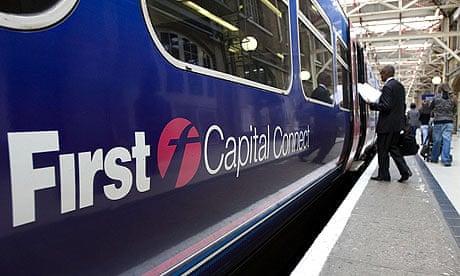Go-Ahead has promised to transform services on one of Britain's busiest commuter routes after winning the merged Thameslink franchise and marking the end of the First Capital Connect brand.
Govia, a joint venture between Go-Ahead and France's state-owned Keolis, will start operating the new Thameslink Southern and Great Northern (TSGN) franchise before the end of the year after the first major tender the Department for Transport (DfT) has awarded since the west coast debacle in 2012.
David Brown, Go-Ahead's chief executive, said: "Our bid for the franchise was focused on improving customers' experience." He said there would be additional peak hour services, new trains and 20,000 hours of customer service training for staff.
Govia already operates Southern, which will be part of the new mega-franchise which will run until 2021 and generate revenues of £12.4bn. TSGN will also deliver the government's Thameslink project, for which major work on track and stations is well under way that will allow 24 trains an hour to travel between Blackfriars and St Pancras in central London. Brown said they would draw on Keolis's experience of Paris's RER cross-city transit.
The franchise departs from previous models, with Govia now handing over revenue to the government rather than paying set premiums. Instead, the DfT will pay Govia a flat fee of around £8.9bn over the seven years, from expected revenues of £12.4bn – effectively generating a total premium of £3.5bn from Govia in traditional terms.
The train operator expects to make a 3% profit. Risks on costs will be Govia's, while the DfT will profit or lose from fluctuations in revenue.
Brown said some passengers would face disruption during major works and that changes would come gradually across the network. "We have to really focus on communicating with our customers on what changes are really taking place."
Nearly 1,400 new electric carriages will be rolled out across the new franchise by the end of 2018, providing 50% more capacity and 10,000 extra seats each weekday into central London during the morning peak hours. Most will be Thameslink trains built in Germany, after the carriage building contract was controversially awarded to Siemens rather than Bombardier in Derby.
Govia will also order a new fleet of 108 carriages for the Gatwick Express service, replacing the current 25-year-old trains by 2016. Gatwick airport said it warmly welcomed news of the award, saying it would "deliver a hugely improved service and experience for our passengers as well as the local communities". Another 150 new carriages will replace the 40-year-old trains currently operating on the route between Moorgate, north London and Hertfordshire, in 2018.
The new operator will also have to meet tough targets to improve punctuality, reducing delays by around a fifth, and to improve cleanliness. A £50m investment to enhance the 239 stations will include improvinged access and information, with free wifi onat aroundbout half of them.
Combined, tThe existing Thameslink and Southern franchises account for 273 million passenger journeys a year, employ 6,500 people and generate annual passenger revenues ticket sales of £1.3bn. The Southern and Gatwick Express brands will be retained, while Thameslink replaces First Capital Connect from September.
Go-Ahead shares rose 10% on Friday morning.
The rail minister, Stephen Hammond, said: "A world class railway is a vital part of our long-term economic plan. New state-of-the-art trains, more seats, better connections and improved stations will transform travel across London and the south-east. That's great news for businesses and the hundreds of thousands of passengers who use these vital services every day."
The outcome was another blow to FirstGroup's rail ambitions after it won the west coast route in 2012, but then promptly lost the franchise when the DfT admitted the bidding process was flawed. FirstGroup shares fell 3.6% in early trading. FirstGroup's T, and the company's chief executive, the former London Underground boss Tim O'Toole, said he was disappointed to lose the route.
"We submitted a strong bid which would have delivered high quality services for passengers, value for taxpayers and an economic return for shareholders," he said. "We are tremendously proud to have operated a significant part of this network over the past eight years through our First Capital Connect franchise, and of the many improvements we have delivered during that time."
